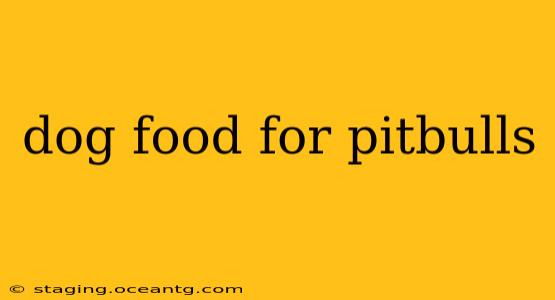Pit Bulls, with their powerful build and energetic nature, require a diet that supports their unique needs. Choosing the right dog food is crucial for their health, growth, and overall well-being. This comprehensive guide will delve into the essential factors to consider when selecting the best dog food for your Pit Bull, addressing common questions and concerns.
What are the Nutritional Needs of a Pit Bull?
Pit Bulls, like all dogs, need a balanced diet rich in protein, healthy fats, carbohydrates, vitamins, and minerals. However, their muscular build and active lifestyle often mean they require a higher protein intake compared to less active breeds. This protein fuels their muscles, supports tissue repair, and contributes to a healthy coat and skin. The ideal protein source should be easily digestible, such as chicken, beef, lamb, or fish. Avoid fillers like corn, wheat, and soy, which can often cause digestive issues and allergies in sensitive breeds.
What Kind of Dog Food is Best for a Pit Bull Puppy?
Puppyhood is a critical period of rapid growth and development. Therefore, Pit Bull puppies require a food formulated specifically for their age. Look for puppy food that's high in protein and fat to support their growth, with added calcium and phosphorus for strong bones and teeth. The food should also contain DHA and ARA, essential fatty acids that support brain development. Avoid foods with artificial colors, flavors, and preservatives, as these can be harmful to developing puppies.
What are the Best Ingredients to Look For in Pit Bull Food?
When choosing dog food for your Pit Bull, prioritize high-quality, recognizable ingredients. Look for foods with:
- Named meat sources: Instead of vague terms like "meat by-products," opt for specific sources such as "chicken," "beef," or "salmon."
- Whole grains: While avoiding fillers is important, whole grains like brown rice or oats can provide beneficial fiber and energy.
- Fruits and vegetables: These provide essential vitamins, minerals, and antioxidants.
- Healthy fats: Sources like fish oil (rich in Omega-3 fatty acids) and chicken fat contribute to healthy skin and coat.
- Prebiotics and probiotics: These support gut health and improve digestion.
What Should I Avoid in Pit Bull Dog Food?
Several ingredients should be avoided when selecting dog food for your Pit Bull:
- Fillers: Corn, wheat, and soy are common fillers that offer little nutritional value and can contribute to allergies.
- Artificial colors, flavors, and preservatives: These can be harmful to your dog's health.
- By-products: These are low-quality ingredients with minimal nutritional value.
- Excessive carbohydrates: While carbohydrates are necessary, excessive amounts can lead to weight gain and other health problems.
Is Grain-Free Dog Food Better for Pit Bulls?
Grain-free diets have become popular, but they aren't necessarily better for all dogs, including Pit Bulls. While some Pit Bulls may benefit from a grain-free diet due to allergies, others may thrive on food containing whole grains. The best approach is to carefully consider your dog's individual needs and consult with your veterinarian.
How Much Should I Feed My Pit Bull?
The amount of food you should feed your Pit Bull will depend on factors such as its age, weight, activity level, and the specific food you choose. Always follow the feeding guidelines on the dog food packaging, but remember that these are just guidelines. Monitor your dog's weight and adjust the food amount as needed to maintain a healthy body condition. Consult your vet if you have any concerns about your dog's weight.
Can I Feed My Pit Bull Human Food?
While occasional table scraps might seem harmless, a regular diet of human food is not ideal for Pit Bulls. Human food often lacks the necessary balance of nutrients and can contain ingredients that are toxic to dogs. Stick to a high-quality dog food formulated to meet their nutritional needs.
What are the Signs of a Poor Diet in a Pit Bull?
A poor diet can manifest in various ways, including:
- Weight problems: Both obesity and excessive thinness are indicators of a dietary imbalance.
- Skin and coat issues: Dull, dry coat, itching, or excessive shedding can suggest nutritional deficiencies.
- Digestive problems: Diarrhea, vomiting, or gas can be signs of food sensitivities or digestive upset.
- Low energy levels: A poor diet can lead to fatigue and lethargy.
If you notice any of these signs, consult your veterinarian to determine the cause and adjust your Pit Bull's diet accordingly.
Remember, choosing the right dog food is a crucial aspect of responsible Pit Bull ownership. By understanding their specific nutritional needs and carefully selecting a high-quality food, you can ensure your Pit Bull lives a long, healthy, and happy life. Always consult your veterinarian for personalized dietary recommendations.
